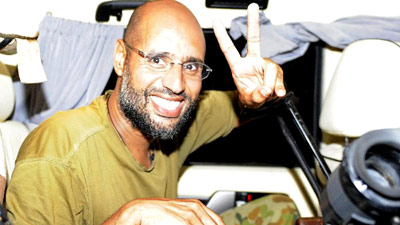Battle of Tripoli rages on as Gaddafi's son makes appearance
 0 Comment(s)
0 Comment(s) Print
Print E-mail
Xinhua, August 23, 2011
E-mail
Xinhua, August 23, 2011

The battle between rebels and forces loyal to Muammar Gaddafi went on in the capital Tuesday, as a prominent son of the embattled Libyan leader made public appearance despite earlier reports he had been arrested by the rebels.
Saif al-Islam Gaddafi, the well-known son of Gaddafi, held a news conference Tuesday at his father's Tripoli bastion of Bab al-Aziziyah, denying being arrested by the rebels.
Saif claimed that the capital is still in government's control and blamed the West for using hi-tech methods to disseminate rumors among his countrymen in a bid to create chaos and an atmosphere of fear.
He arrived in the bastion in a four-wheel-drive, to the cheers of dozens of awaiting supporters waving Libyan national flags and portraits of Saif and his father, whose whereabouts is still a myth. Saif said his father is still in Tripoli and safe, though the claim is hard to verify.
Earlier in the day, Saif made a brief visit to the Rixos hotel where dozens of foreign reporters are staying, arriving in a convoy of armored Land Cruisers, more than a day after rebels claimed they had captured him.
According to a Xinhua reporter, both the hotel and the Bab al-Aziziyah compound just across the street apparently are still under the control of Gaddafi's troops, so it is no suprise that Saif could travel between the two locations as he wishes.
Meanwhile, Libya's ambassador to the United States Ali Suleiman Aujali who already defected to the rebels, told CNN that another son of Gaddafi, Mohammed Gaddafi, who had been captured by the rebels, has escaped.
Iraqi press quoted Gaddafi's spokesperson as saying that Mohammed was resuced by Libyan government troops and he is now in a very safe place.
There has been no immediate explanation from the Benghazi-based rebel National Transitional Council (NTC) which had announced the capture of both Saif and Mohammed.
In a telephone interview with al Jazeera, Waheed Burshan, rebel leader in the town of Gharyan, said Saif had been arrested but somehow managed to escape from his captors.
Burshan referred to questions of "inexperienced youth" and the lack of a "structured military guard".
The state TV has stopped broadcasting as rebels claimed control of the Gaddafi mouthpiece. But Internet and telephone lines are still working as usual in the capital.
As a Xinhua reporter witnessed, the rebels were apparently in control of the most parts of the city and the suburbs, and have set up a network of checkpoints. Gasoline is in shortage and most of the residents chose to stay at home as the outside is preceived as too dangerous because of the continuous fighting.
Lastest reports from Arabiya TV said blasts were heard near the Bab al-Aziziyah compound. Other foreign media outlets also reported fierce clashes in several locations of the city, with pro-Gaddafi forces using mortars and other heavy weapons.
Although rebels had already announced the end of Gaddafi's 41-year rule, there were signs that the armed conflict is not over yet as Saif's appearance and bouts of fierce fighting in Tripoli threw doubt on some of the rebels' claims.
In Zawiya, a strategic gateway 50 km west of the capital captured by rebels days earlier, renewed fighting was reported.
Meanwhile, NATO confirmed that three surface-to-surface missiles were fired from Gaddafi's hometown of Sirte Monday evening, with initial reports indicating they landed in the coastal area of Misrata, which is under the rebels' control.
Amid conflicting reports from Libya, U.S. President Barack Obama admitted that the situation there "is still very fluid," saying "there remains a degree of uncertainty and there are still regime elements who pose a threat."
UN secretary-general Ban Ki-moon said Monday that his representatives have not been able to contact Gaddafi although "we've been trying to get in touch with him."
Ban also said he plans to hold an urgent high-level meeting in the coming days to discuss Libya situation with the African Union, the League of Arab States and the European Union.





